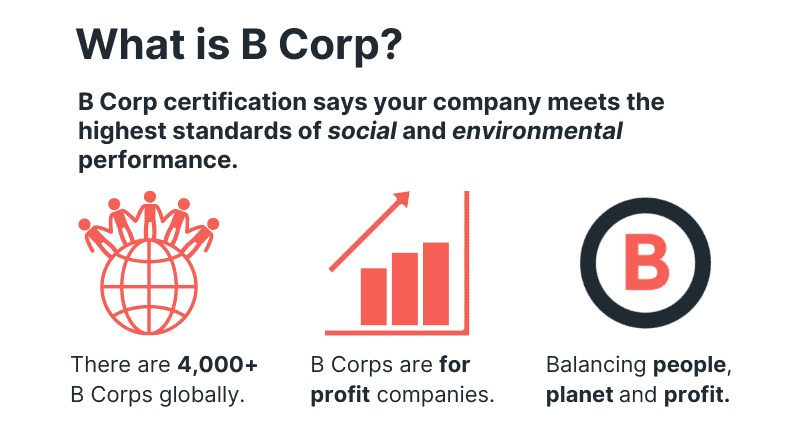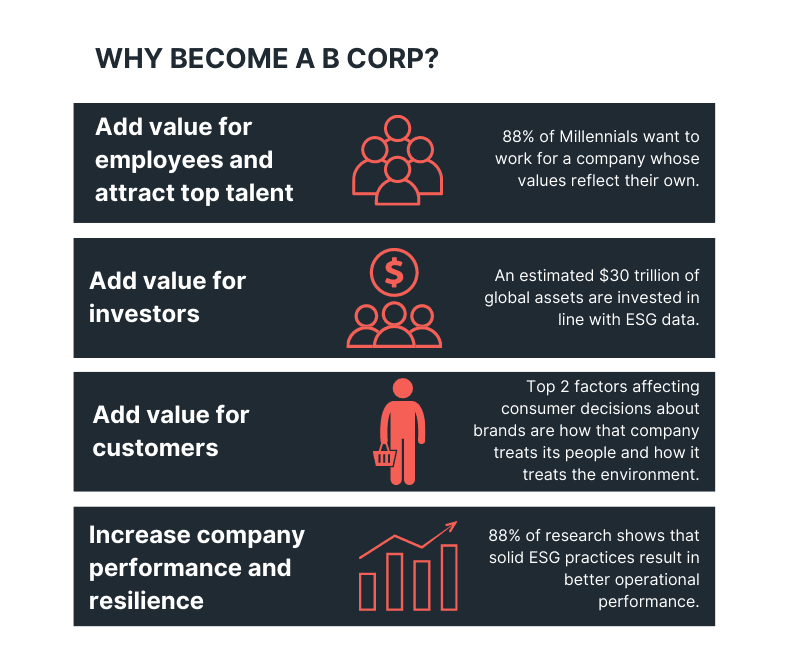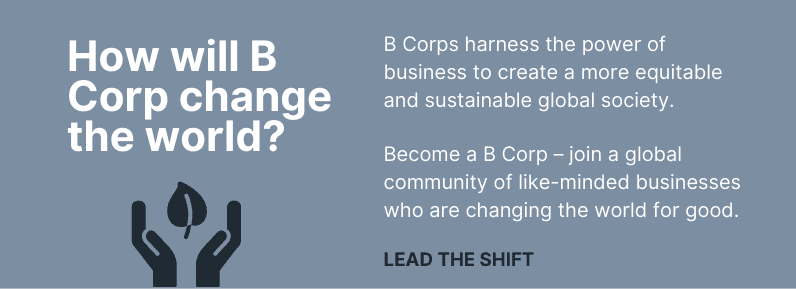
Andy Schmidt, Cofounder of sustainability consultancy Seismic, says the Covid-19 pandemic has accelerated the existing corporate focus on sustainability and highlighted the value of B Corp certification as an assessment of companies’ progress.
What makes the B Corp status different from other sustainability-oriented certification programmes? Schmidt emphasises the depth and thoroughness of the verification process – essential at a time when companies must counter skepticism of their commitment to sustainability as well as suspicions of greenwashing.
How has the world changed from the pre-pandemic era regarding sustainability?
Those of us who have been in the sustainability and impact field for a decade or more have seen momentum building for businesses to undertake a ‘sustainability journey’ and work toward becoming responsible, sustainable businesses that think about the impact of their activities on multiple stakeholders. That trend has accelerated as a result of the pandemic.
Last year, companies responded in different ways.
Some of them suffered mission-critical crises as a result of movement and travel restrictions and, therefore, had to suspend some sustainability initiatives for the time being. But we have seen them subsequently return to those initiatives and activities with increased focus and attention.
Other businesses with sustainability initiatives underway or planned reflected that they could use the lockdown as an excuse to stall. But their leadership team remained convinced that going ahead was the right thing to do – and that the pandemic created a moral imperative to push forward their sustainability agenda.
Still others used the slowdown and new working arrangements — and the extra bandwidth that offered — to redeploy their time in order to address sustainability, social and environmental performance issues.
There are a number of indicators that focus on sustainability has broken through a new threshold in the past 18 months. It was already growing ahead of the pandemic, but Covid-19 has accelerated an existing trajectory and momentum.
What is a B Corporation?
An initial way to define B Corp is to compare it to other, more familiar frameworks or processes such as Fairtrade or Organic, or green building certification. B Corp is similar but looks not just at a product or part of a company’s activities. Rather, it examines a business and its activities as a whole and its holistic impact on a variety of stakeholders. If you want to start your business’s B Corp journey, then make sure to check out how we at Seismic can help you achieve B Corp.
B Corp is a practical, action oriented framework that looks at the entirety of a company’s business activities in order to help an organisation understand, improve, measure and communicate its impact on the world.
The backbone of the B Corp management framework is the B Impact Assessment, an online tool used by more than 100,000 organisations worldwide, in all sectors and industries and of all different sizes, from sole traders to multi-national corporations.
As well as being an assessment any company can use to reflect on and better understand where it’s doing well and opportunities for improvement, those that aim to score high enough in social and environmental performance can have their assessment reviewed and verified by an independent third party, the standards analyst team at B Lab, the non-profit organisation behind the management framework.
Those able to achieve and maintain a score of over 80 points can choose to become a certified B Corp company. Of the 100,000+ organisations using the B Impact assessment, 4,000 have achieved B Corp status, including 1,100 in Europe and the UK, home to the fastest-growing B Corp community around the globe.
One of the things that differentiates B Corp from other sustainability standards or methodologies is access to this community of 4,000 certified B Corporations and other organisations on a B Corp journey. It’s a community of progressive leaders who believe business can and should be a force for good in the world.
They are part of a movement to create a new type of economic model, a shift from the belief that the sole purpose of a corporation is to create value and maximise profit for shareholders to a belief that its purpose is to create value for all stakeholders, including shareholders but also employees and customers and the communities in which businesses operate, and the natural environment upon which we all depend. The purpose of this new economic model is to create shared and durable prosperity for all.
Pursuing B Corp certification is a long process that demands significant resources. What does it offer a company or organisation?
‘Why become a B Corp?’ is a question we get asked a lot at Seismic.
Truth is, if you ask 20 different companies why they chose to become a certified B Corporation, you will receive 20 slightly different answers. But there are some recurring themes.
For example, in a fast-changing business environment, expectations of customers, employees, investors and governments are evolving at a rapid pace.
Going through the B Corp process – completing the B Impact assessment and mapping out a course for improvement – helps provide confidence and clarity that you have your house in order, using a framework that is updated regularly to reflect those changing stakeholder expectations, and that you are in a strong position to seize the opportunities arising from the increased focus on sustainable businesses and brands, as well as minimising the risk of failing to meet market expectations.
In addition, credibility represents a major added value. The responses in the B Impact assessment – your claims as a business about good practice – are verified by an independent third party.
Many corporate leaders we talk to are investing in sustainability and want to give their business and their brand credit for that. They’re also concerned about accusations of greenwashing – and B Corp, because of its thoroughness and verification probably is the closest thing available as an answer to greenwashing.
Other benefits include that B Corps love to do business with other B Corps. When they need a new service provider for a product or service, often the first place they go is to directory to see if they can find a B Corp that provides what they are looking for. That’s because of a natural alignment of values, and because they want to use their purchasing power to support organisations that act responsibly, limit their negative impacts and have a positive impact. Choosing to buy from B Corps takes a lot of the guesswork and analysis out of that process.
It also adds significant value in competition for talent. It’s not uncommon to hear of companies that needed to recruit regularly prior to becoming B Corps being able after certification to reduce that time significantly because the best talent from their and other industries are knocking on their door.
We’re also seeing a lot of interest in B Corp from the investor community, which we believe reflects factors such as institutional investors wanting to make sure that their investments do good rather than harm, as well as a trend toward increased interest in acquisition of B Corps by larger businesses – which also boosts exit opportunities for investors.
How will a certified B Corp be different at the end of the process from where it started?
That depends on how much you choose to embed and embody the B Corp mentality. But regardless, you will have become a significantly different organisation, not least through changes in your processes. In many cases, companies may already have a spirit of doing things a certain way but the certification process gives this consistency and structure.
All businesses, regardless of how big or small or young or old they are, always have some ‘ways we do things’ that benefit from clarity and formal commitment.
Why does the process take so long – for instance 10 years for large companies such as Danone, and six months even for a smaller organisation?
Companies of different complexity have different pathways to certification. The more complex an organisation, the higher the likelihood that they are impacting a wider range of stakeholders or impacting them in deeper ways. So they need an even more comprehensive and structured process for assessing and verifying that impact.
The standards team at B Lab will seek to understand an organisation’s complexity to determine which pathway is right for them. A company with less than $100 million in annual revenue can typically follow the standard approach to certification, which involves completing the B Impact assessment and having it reviewed and verified by B Lab team to achieve a qualifying score of 80 points or more signed off by the standards team.
Companies with revenue exceeding $100 million may have to follow a more structured process, including a couple phases of pre-assessment to get a high-level idea of where a company is doing well in terms of impact and social and environmental performance, as well as risk and eligibility reviews.
A company with multiple product or service lines or business units, or operating in multiple industries or geographical areas, may need to complete multiple B Impact assessments to obtain a detailed view of its activities and impact.
Those with more than $1 billion in annual revenue go through that large-enterprise process but may have additional upfront requirements relating to human rights, financial reporting or other disclosures as a base to start from.
How does B Corp differ from other sustainability-oriented certification programmes? Does it make sense to do more than one?
There are many sustainability frameworks that an organisation may choose to adopt. Which one is right for a particular business is a very important question.
A business using existing sustainability frameworks, especially in the area of reporting requirements such as the Global Reporting Initiative or the Sustainability Accounting Standards Board or CDP (the former Carbon Disclosure Project) on the environmental side will find the work done for those frameworks useful for completing the B Corp framework. However, in our experience, the B Corp framework does require an additional level of detail. Conversely, companies that have completed the B Corp process will have a wide range of information and insights that can enhance reporting under other frameworks.
What are the biggest challenges for companies undertaking the B Corp assessment process?
While on the whole very practical, the B Impact Assessment is nuanced. Many individuals completing the assessment second-guess whether how they are responding is right, which can lead to confusion. And misunderstanding of the question can cost points during the verification phase or require a reformulation of the company’s response, leading to duplicated efforts and frustration.
Another challenge for organisations can be that while sustainability and B Corp certification may be viewed as a strategic priority or objective, they can be deprioritised as a result of day-to-day emergencies, and a project intended to happen over the next couple of quarters can become an drawn out workstream.
That can cost motivation and momentum if things just drag on.
In your experience of working with companies of all sizes, what common mistakes do they make in seeking to achieve B Corp certification?
One that’s not obviously apparent is to get on the right B Impact assessment track. A company setting up its profile on the online platform will be asked various questions about sector and size in terms of employee numbers. Making sure those are answered accurately is really important because they determine the B Impact assessment track and the set of questions you will see.
If you’re not on the right track, you are likely to be asked questions that are not relevant to your business — and not receiving questions you should be seeing — which will fail to measure the real impact of your business activities. Another very common mistake is giving yourself more credit than the standards analysts would.
Companies that follow good practices some, but not all the time, may find that a standards analyst has a different view and your score might drop.
Others take what we call an aspirational view in responding to the assessment questions – rather than the conservative view we recommend – and for example say, “We’re not doing that right now, but we plan to do it in the next quarter.”
If that never happens, you could lose sight of that and by the time you get to the verification phase there’s a handful of things you planned to do but never got around to…so your score drops significantly.
We have heard from the standards team that it is not uncommon for a company score to drop by more than 20 points during the review and verification phase. Being conservative and offering an objective and accurate view of where you’re at currently is of critical importance.
What advice would you offer an organisation considering certification?
What we consider an aspirational approach to responding is where things get messy and leads to unwelcome surprises during the verification phase. To make sure there are no big surprises when companies are having their B Impact assessment reviewed by a standards analyst, our advice is to always to take a realistic view of where things are. Do not describe some future state.
The other thing is to document everything. If you are undertaking this B Corp journey, working to get an initial score, perhaps implementing improvements over a number of months and eventually being reviewed by a standards analyst, from beginning to end there will be a fair amount of time.
To remember how you were looking at things when you responded to a question in a certain way, we recommend that you document your thinking thoroughly, how you perceived the question, and maybe record what you will have to provide in evidence. Because you want to be sure that your response can be verified.
This interview with Seismic Co Founder, Andy Schmidt, was conducted by the CEO & Co-Founder of VitalBriefing and Pulitzer prizewinning journalist David Schrieberg.
Are you ready for B Corp certification?
Find out if your company is ready to start its B Corp journey and get tips for a successful certification.






